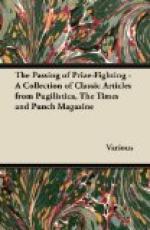I am afraid that envy was the predominant feeling aroused by Mr. SNOWDEN’S story of the family in New Cavendish Street which secured in a single order from a single firm no less than sixty-three pounds of sugar. Lest any Hon. Members should be tempted to try and do likewise Captain BATHURST promptly announced that another order prohibiting hoarding would shortly be issued. The House cheered, for, as a journalist Member remarked with gloomy satisfaction, “It is only fair that ‘no posters’ should be followed by ’no hoarding.’”
The PRIME MINISTER paid one of his angelic visits to the House to give the latest information of the revolution in Russia. His description of it as “one of the landmarks in the history of the world” evoked loud cheers, but even louder were those which came from the Nationalist benches when he remarked that “free peoples are the best defenders of their own honour.”
Tuesday, March 20th.—A long cross-examination of the representative of the Air Board produced one valuable statement which Members generally might bear in mind. Mr. BILLING asked if it was not “in the public interest or in the interests of this House” that certain contracts should be discussed. Fixing him with his eye-glass, Major BAIRD replied, “No, the interests of the House and of the public, I take it, are the same as the interests of the nation.”
[Illustration: DEFENSIVE DUET BY MESSRS. ASQUITH AND WINSTON CHURCHILL.]
If there was any lingering doubt as to the main responsibility for the inception—as apart from the carrying out—of the Dardanelles affair Mr. CHURCHILL himself must have removed it. Unlike his former chief he welcomes the publication of the Report, which in his opinion has shared among a number of eminent personages a burden formerly borne by himself alone. But his enthusiasm for the project as it originally formed itself in his fertile brain is undiminished, and he still marvels that for the want of a little further sacrifice we should have abandoned the chance of cutting Turkey out of the War, and uniting in one friendly federation the States of the Balkans.
Wednesday, March 21st.—General MAUDE’S manifesto to the people of Baghdad, with its allusions to the tyranny under which they had long been suffering, did not escape the eagle eye of Mr. DEVLIN, ever anxious to scarify British hypocrisy. So he drafted a long question to the PRIME MINISTER, embodying the most salient passages of the manifesto. Much to his disgust it appeared on the Paper without its “most beautiful and striking passages.” The SPEAKER explained that he had blue-pencilled “a good deal of Oriental and flowery language not suitable to our Western climate.” Not the least part of the joke is the rumour that the manifesto was largely the work of a Member of the House well versed in Eastern lore.




